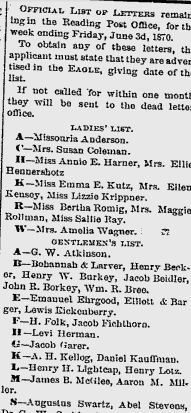Two Brothers and Two Sisters go West
Newspapers are contemporaneous sources for court cases, property sales, fires, legal proceedings, deaths, marriages, births, robberies, injuries, nightly lockups, and even unclaimed letters.
The Official List of Letters remaining in the Reading Post Office for the week ending 3 June 1870 included Missouria Anderson, Susan Coleman, Annie E. Harner, Ellie Hennershotz, Emma E. Kutz, Ellen Kensoy, Lizzie Krippner, Bertha Romig, Maggie Rollman, Sallie Ray, Amelia Wagner, G. W. Atkinson, Henry Becker, Henry W. Burkey, Jacob Beidler, John R. Borkey, Wm. R. Bree, Emanual Ehrgood, Lewis Eickenberry, H. Folk, Jacob Fichthorn, Levi Herman, Jacob Garer, A. H. Kellog, Daniel Kauffman, Henry H. Lightcap, Henry Lotz, James B. McGee, Aaron M. Miller, Augustus Swartz, Abel Stevens, G. W. Smith, Aaron Shock, J. J. Shauks, William Siegwert, Walter Vane, Charles Wheeler and W. F. Washington.
A list of unclaimed letters doesn’t really tell a researcher much except someone didn’t pick up his or her mail. The reasons behind that could be as simple as no one was home for delivery, there was postage due, she was working, she was on vacation, she was visiting, she was giving birth, she died, he was at the machine shop, he was in jail, he moved, he was ill or injured and so on and so forth. It does indicate that someone knowingly mailed a letter to someone at a Reading address, it could indicate potential literacy (or not).
A migration story could be a nice genealogical treat about Peter Shearer, Jonathan Shearer, his family of wife and two children, his wife’s sister, and Samuel Zacharias joining the Union Colony No. 1 in Colorado. Did they get there, stop on the way or return home?
Jonathan Shearer’s wife and her sister, neither of their names mentioned, first, middle or last, left Berks Co. for Greeley in the spring of 1870. That clue could spell the difference between finding the parents or not finding the parents.
A completely unrelated story with no genealogical value whatsoever is the fishing story.
Other than placing a specific person in a specific locale at a specific time, this story doesn’t do much genealogically except give a newspaper’s rendition of the spelling of the family surname (which could be wrong). The surname Phillippi in this article, while it was frequently spelled with one L or a single P or the letter Y ending it or some of the above or all of the above, gave me a starting point.
All three of these snippets came from the 3 June 1870 edition of the Reading Eagle, published in Berks Co. Pennsylvania. The real treat is to read the whole newspaper to find out what was happening in town at the time. Without local flavor, it’s hard to put a specific ancestor in context.












